Education
The End of the No-Detention Policy: Government Schools Can Now Fail Students in Classes 5 and 8

Contents
Introduction to the No-Detention Policy
The no-detention policy was introduced in various government schools as a part of the Right to Education Act in India, which came into effect in 2009. This policy aimed to provide a more inclusive education system by ensuring that students would not be failed or retained in a particular class until they completed the elementary stage of their education, specifically up to class 8. The primary objective was to reduce the pressure and anxiety associated with examinations, thus allowing children to focus on learning rather than merely passing tests.
Supporters of this policy argued that it fosters a more conducive learning environment, enabling students to explore their interests and develop skills at their own pace. The rationale for the implementation of the no-detention policy was rooted in the belief that educational failure often leads to dropout rates, particularly among marginalized communities. By removing the fear of failure, the policy aimed to encourage continuous attendance and promote the right to education for all children, regardless of their academic performance.
However, the no-detention policy also faced criticism regarding its effectiveness. Critics pointed out that while the intention was noble, the actual educational outcomes were less than satisfactory. Many students graduated to higher classes without possessing the necessary foundational skills. This led to concerns about educational quality and performance, as continuously promoting students without adequate assessment measures could result in a significant skills gap. Consequently, as the government reviews this policy, it highlights the ongoing debate about how best to balance the need for student support with the necessity for academic accountability.
The Recent Policy Change
In a significant shift in educational policy, the government has announced that it will allow failure for students in classes 5 and 8 at government schools. This decision marks the end of the no-detention policy that had been in place for several years, which prohibited schools from failing students until they reached the end of class 8. The government’s official announcement was made in October 2023, indicating a clear intent to enhance academic accountability among students.
The primary reasons for this policy reversal revolve around concerns regarding educational standards and learning outcomes. Over the years, numerous reports and studies highlighted a declining quality of education, with many students completing primary education lacking fundamental skills in literacy and numeracy. Critics of the no-detention policy argued that it inadvertently lowered academic rigor while enabling a pass without adequate comprehension or knowledge. There was a consensus among education experts that holding students accountable for their academic performance is essential for fostering a sense of responsibility and motivation.

The implementation timeline for this policy change is set to begin at the start of the upcoming academic year. Schools will be required to conduct regular assessments in classes 5 and 8 to evaluate student performance. According to the new directive, students who do not meet the requisite standards will face a realistic challenge in progressing to the next class. In preparation for this shift, the government has committed to providing additional training and resources to teachers, ensuring they are equipped to support students in meeting these expectations.
Discussions leading up to this decision included various stakeholders, such as educators, parents, and policy advocates. These conversations underscored the need for a balanced approach, promoting student learning while recognizing the potential negative impact of increased pressure on young learners. Ultimately, the government’s decision reflects a measured response aimed at restoring educational integrity while considering the developmental needs of students.
Reasons for Ending the No-Detention Policy
The decision to terminate the no-detention policy in government schools for classes 5 and 8 has generated significant discussion. Various factors contributed to this policy change, primarily focusing on concerns regarding student academic performance, accountability, and the overall quality of education. Educators and parents alike have expressed dissatisfaction with the existing system, which many felt undermined the seriousness of academic achievement.
Firstly, one of the leading motivations behind this policy change is the observed decline in student performance. Since the no-detention policy was implemented, there has been a noticeable trend of students progressing to higher grades without acquiring essential skills and knowledge necessary for their future academic endeavors. This lack of preparedness raised alarms among educators, who noted the gap between students’ actual capabilities and the curriculum requirements. Many schools reported that several students struggled significantly in subjects, failing to meet the expected learning benchmarks.

Accountability has also emerged as a central issue, with concerns about the responsibility of teachers and educational institutions. Under the no-detention policy, many educators felt a diminishing sense of accountability for their students’ learning outcomes. The inability to hold students back for inadequate performance diluted educators’ motivation to maintain rigorous instructional standards. As a result, educators began advocating for a system that would foster a culture of responsibility, where students understood the importance of academic engagement and subsequent evaluation.
Additionally, feedback from parents played a crucial role in shaping this decision. Many parents voiced their worries over their children’s educational experience, emphasizing the necessity for a robust assessment mechanism. They argued that providing students with the chance to repeat a grade when necessary would ultimately enhance overall learning and success rates, thereby contributing to a more effective educational framework.
Potential Impacts on Students
The recent decision to allow government schools to fail students in classes 5 and 8 carries significant implications for the educational landscape. One of the most immediate effects pertains to students’ motivation. When students are aware that passing is no longer guaranteed, it may instigate a sense of urgency to their academic endeavors. However, there is also the potential for fear and anxiety, which could profoundly impact their engagement and performance. This dichotomy raises concerns about how the new policy may shape students’ attitudes toward learning.
Furthermore, self-esteem is another critical factor at play. Students who struggle academically are at risk of experiencing diminished self-worth, particularly when faced with the prospect of failure. Early academic setbacks can lead to a longer-term impact on their confidence. If measures are not put in place to support students who require additional help, we may witness an increase in feelings of inadequacy. This emotional toll can hinder not only their present educational outcomes but also their future pursuits in academia and beyond.

From a broader perspective, the shift could exacerbate existing disparities in educational access and outcomes. Students from underprivileged backgrounds may possess fewer resources and less support, making it difficult for them to thrive under the new policy constraints. The potential for failure, coupled with the lack of adequate resources, can lead to a widening achievement gap. It is essential for educators and policymakers to be acutely aware of these disparities, ensuring equitable opportunities for all students, regardless of their socioeconomic status.
In essence, while the intent behind allowing failure may be to instill a sense of responsibility and accountability among students, it is crucial to consider the multifaceted impacts on motivation, self-esteem, and equity in education.
Reactions from Educators and Administrators
The recent decision to terminate the no-detention policy for classes 5 and 8 has elicited a multitude of responses from educators, school administrators, and education experts. Many within the educational community believe this policy shift is crucial for maintaining academic standards. Supporters argue that the previous no-detention system diluted the quality of education, as it allowed students to progress through grades without demonstrating adequate understanding of the curriculum.
One prominent educator, Dr. Anjali Mehta, stated, “The no-detention policy may have been well-intentioned, but it ultimately enabled students to advance without gaining the necessary knowledge and skills. This change could foster a more rigorous academic environment.” Furthermore, a survey conducted by the National Association of Educators found that 65% of teachers believe that this policy change will enhance student accountability and motivation, leading to improved learning outcomes.
Conversely, some educators express concerns about the potential negative impacts on students’ mental well-being and self-esteem. A school principal from Delhi, Mr. Ravi Sharma, voiced his apprehensions: “While we must uphold academic standards, we should also consider that failing a student can have long-lasting effects on their confidence and academic aspirations.” Thus, this transition poses a balancing act between maintaining educational rigor and supporting student mental health.
Amid these varying opinions, educational administrators are also exploring effective strategies and interventions to assist students who may struggle under this revised framework. As outlined by the recent report from the Education Ministry, schools will be encouraged to implement tutoring programs and personalized learning plans to help lower-performing students succeed. It remains to be seen how this policy change will reshape the landscape of education, but the enthusiasm and apprehension among educators are palpable.
Views from Parents and Students
The recent modification of the no-detention policy has sparked a spectrum of reactions from both parents and students, revealing deep concerns, hopes, and fears about its implications on education. Many parents express anxiety regarding the potential for stress and anxiety that failing could introduce to their children. Some worry that the pressure to perform academically may detract from the holistic development of their children, pushing them to prioritize grades over learning. One parent articulated, “The education system should cater to the individual pace of students, and failing them might crush their confidence.”
On the other hand, some parents believe that the policy change could enhance accountability and reinforce the importance of education. They argue that students should understand the significance of academic performance and that facing failures might encourage a stronger work ethic. A father shared his perspective: “Real-life consequences are essential for growth; it reflects the challenges they will face outside of school.” This dichotomy in opinion demonstrates the varying priorities among parents regarding educational outcomes and emotional wellbeing.
Overcoming the Challenges of Failure
The recent shift in policy allowing government schools to fail students in classes 5 and 8 has raised concerns regarding the challenges this may pose to learners. As educational institutions adapt to this new framework, it is essential to implement effective strategies and support systems to assist students who may struggle academically. A multifaceted approach is key to overcoming the potential obstacles related to failing students.
Firstly, remedial measures such as targeted intervention programs should be vigorously pursued. These programs can encompass additional tutoring sessions that focus on core subjects like mathematics and language arts, where students often face difficulties. By providing specialized instruction tailored to the unique needs of struggling students, schools can help close learning gaps and improve overall academic performance. Incorporating peer tutoring can also foster collaboration among students, encouraging them to support one another.
Moreover, schools should consider the establishment of mentoring programs that connect students with educators or older peers. Such relationships can cultivate a sense of belonging and provide personalized guidance, allowing students to express their concerns and seek help when needed. Mentors can offer invaluable insights and strategies for overcoming academic challenges, reinforcing the idea that failure does not define a student’s potential.
Creating a supportive learning environment is also crucial in addressing the emotional and psychological aspects of failure. Open communication between teachers, parents, and students can significantly alleviate feelings of anxiety and stress. Schools should encourage a culture of growth mindset, where failure is viewed as an opportunity for learning rather than a setback. Implementing regular check-ins and feedback sessions can empower students to take ownership of their learning journey and motivate them to improve.
In conclusion, while the end of the no-detention policy may present challenges for students, the development of robust support systems, coupled with a nurturing educational environment, can help them navigate their academic journeys more effectively.
Educating Stakeholders: The Need for Preparedness
The recent shift in educational policy, permitting government schools to fail students in classes 5 and 8, necessitates a thorough preparation process for all stakeholders involved—educators, parents, and students alike. This policy change marks a significant departure from the previously established no-detention strategy, making it imperative for educators to adapt significantly in order to foster an effective learning environment. Professional development opportunities should be prioritized to equip teachers with the skills required to manage students who may not meet academic standards.
This includes training in individualized instruction, intervention methods, and strategies for providing constructive feedback to students. Teachers will benefit from understanding the psychological impacts of failing grades on children and how to support their emotional well-being through supportive pedagogical practices.
Also read : Career Counseling Session Held at Vedanta PG Women’s College, Ringas
Parents also play a crucial role in this transition. Counseling programs should be established to help parents understand the implications of this policy and how they can best support their children. Parents will need guidance on providing appropriate academic assistance and on recognizing signs of academic struggle. Regular communication between schools and families can minimize confusion and anxiety regarding the new expectations. Parents should be informed about resources available, such as tutoring programs and study groups, to ensure their children can succeed in this modified educational landscape.
Moreover, it is essential to ensure clarity in communication across all platforms. Stakeholders should be regularly updated on policy changes and their associated impacts. Town hall meetings, newsletters, and school websites can serve as effective means of disseminating information. Clear messaging will alleviate potential anxiety stemming from misunderstandings about failing grades and help maintain a supportive community environment. Ensuring all stakeholders are well-informed and prepared is pivotal in navigating this significant change in the academic framework of government schools.
Summary and Future Outlook
The recent decision to allow government schools to fail students in classes 5 and 8 marks a significant shift in educational policy. This move effectively ends the long-standing no-detention policy, which aimed to promote inclusivity and prevent dropouts. By reinstating the ability to retain students who do not meet academic standards, the government seeks to enhance the educational experience and ensure that students possess the necessary skills and knowledge before advancing to higher grades.
The implications of this policy change are manifold. Firstly, it is expected to foster a greater sense of accountability among students and educators alike. Students may become more engaged in their studies, understanding that their performance can impact their progression through the education system. Furthermore, teachers may be encouraged to adopt more effective teaching methods and demonstrate increased attention to student learning outcomes. This could lead to improved overall performance within government schools.
In terms of educational reforms, the shift away from the no-detention policy may pave the way for a more robust evaluation system that emphasizes skill development and knowledge retention. It remains crucial, however, for policymakers to ensure that such reforms are implemented with adequate support structures in place. This includes providing additional resources for struggling students, enhancing teacher training, and fostering a collaborative environment between parents and educators.
Looking toward the future, the success of this policy change will largely depend on how it is executed across various government schools. With genuine efforts directed towards bridging the educational gaps, there exists potential for a substantial positive transformation in the landscape of education. As we observe these developments, the focus should always remain on the ultimate goal of ensuring that every student achieves their fullest potential within the academic framework.
Education
Doonites Celebrate “Blue Day” – A Splash of Serenity and Joy

Contents
Hathras, July15,2025
On July 15, 2025, the auditorium of Doon Public School, Hathras turned into a vibrant sea of blue as the Primary (Foundation) Department celebrated “Blue Day” with great enthusiasm. The event was graced by the honorable presence of Principal Mr. J.K. Agrawal and held under the thoughtful guidance of Primary Coordinator Mrs. Namrata Agrawal.
The celebration began with the ceremonial lighting of the lamp and floral tribute at the feet of Goddess Saraswati by the Principal, marking an auspicious start to the day. In a heartwarming gesture, the Primary Department welcomed the Principal by presenting him with a blue tie, in tune with the day’s theme.
The entire school came alive with the spirit of the occasion as both teachers and young children arrived dressed in beautiful shades of blue, making the environment truly captivating.
The highlight of the event was the delightful musical performances by the tiny tots of LKG and UKG, who left everyone spellbound with their energy and innocence. The air was filled with rhythm and color as the children performed poems, songs, and dances individually. A charming ramp walk followed, where the young ones confidently showcased their talent, creativity, and poise.
Some of the standout performers included:
- From Nursery: Ayaan Khan, Pulkit Singh
- From LKG: Utkarsh Soni, Riyansh Siddharth, Kanishk, Iba Zainab, Arya Gupta
- From UKG: Shivansh Agrawal, Ridyanshi Agrawal, Swastik Anil Chaudhary, Kavyansh Sengar, Divyansh Kumar, Siddharth Agrawal, Shaanvi Chaudhary, Vedika Negi, and others.
The children’s performances filled the entire auditorium with joy and cheer, creating unforgettable memories for all present.
Adding a creative culinary twist to the celebration, students brought blue-themed food items in their tiffins—such as jamun, blueberries, and blue-colored sweets—which reflected the theme even in their meals.
Addressing the gathering, Principal Mr. Agrawal emphasized the significance of “Blue Day,” stating,
“Blue Day is not just about identifying a color, but also about fostering emotional development, cultural participation, creativity, and awareness. The color blue symbolizes peace, calmness, and focus. It has a positive psychological impact on children.”
Indeed, “Blue Day” was not just a celebration of color, but a beautiful opportunity to understand the importance of colors in life while having fun. It was a perfect blend of learning and joy.
Environment
Literature and Environment Are Both Sources of Sensitivity”Tree is Life: Grand Celebration of ‘Ek Ped – Sampark Ke Naam’ and Poetry Recitation on Environment

Jaipur, July 14,2025
A Heartfelt Environmental and Literary Initiative by Sampark Sansthan Receives Overwhelming Response at Gyan Vihar School Campus Jaipur.
The joint initiative of Sampark Sansthan and Gyan Vihar School, titled ‘Ek Ped – Sampark Ke Naam’, along with an environmental poetry recital, turned out to be a meaningful confluence of ecological awareness and literary sensibility. Students, teachers, poets, and social workers participated in the event with deep enthusiasm and emotional engagement.
Welcoming everyone, Sampark Sansthan President Anil Ladha remarked,
“This is not just an event, it’s an attempt to connect life and society through tree plantation. We want every individual to nurture a tree as lovingly as they would nurture a relationship.”
Dr. Ritvij Gaur (Principal), present as a special guest, emphasized in his speech,
“Trees are the foundation of our culture and survival. Teaching children to emotionally connect with nature through tree planting is the need of the hour.”

Sampark Sansthan General Secretary and Coordinator Renu ‘Shabdmukhar’ touched hearts with her words,
“This initiative aims to instill in students a sense of responsibility and the spirit of coexisting with trees. When nature and poetry walk together, society becomes truly awakened.”
Veteran poet Prof. Prabodh Govil inspired the audience, stating,
“Literature and environment are both profound sources of human sensitivity.”
Renowned writer Dr. Jayshree Sharma added,
“Trees don’t just give us oxygen, they teach us life values. A poem, a plant, and a thought — these can together change the world.”
Inspiring the young generation, senior poet Anshu Harsh quoted,
“When you walk ahead, many will follow.”
Usha Rastogi’s positive presence brought an energetic vibe to the event.
Program Coordinator Himadri Samarth expressed that,
“No matter what name we give to the campaign, the aim remains the same – to protect the environment.”
He concluded by thanking all the distinguished guests for their participation and support.
The event was beautifully hosted by Seema Walia, whose graceful voice, articulate language, and emotional tone left a lasting impact on everyone present.
The active participation of Gyan Vihar students made the event truly vibrant. When tiny hands touched the soil and planted saplings, it was more than an activity — it became a symbol of emotional bonding with nature.
Students like Charul, along with senior poets — Dr. Neelam Kalra, Renu Shabdmukhar, Himadri, Dr. Kanchana Saxena, Sonal Sharma, Dr. Anju Saxena, Avinash Joshi, Dr. Punita Soni, Kavita Mathur, S. Bhagyam, Rao Shivraj, Dr. Deepali, Vijayalakshmi, Sushila Sharma, Sushma Sharma, Meena Jain, Mahesh Sharma, and Nisha Jha — delivered powerful poetic performances centered on environmental consciousness. The students not only listened but also absorbed the essence of literature as a tool for raising awareness about nature.
The event sent a strong message — if the young generation connects with nature today, the future will be safe, beautiful, and full of hope.
India
Celebrating Young Minds: Vardhman Srikalyan International School Invites Schools to Dr. Mool Chand Sethia Memorial Inter-School Competitions

July 14,2025
— A Festival of Talent, Thought & Team Spirit from July 23–26, 2025
In a heartfelt and inspiring move, Vardhman Srikalyan International School, Hathoj, Jaipur, has extended a warm invitation to reputed schools across the region to participate in a prestigious three-day event — The Dr. Mool Chand Sethia Memorial Inter-School Competitions, beginning July 23, 2025. The event will conclude with the much-awaited B.D. Joshi Memorial Debate Competition on July 26, 2025.
The school’s Principal, Mrs. Renuka Joshi, in her message to fellow educators, emphasized that the event is not just a competition, but a celebration of intellect, creativity, and collaborative spirit.
“We aim to create a vibrant, inclusive platform where students can exchange ideas, challenge their boundaries, and celebrate diversity of thought. It’s a rare chance for students to shine beyond the classroom and build friendships that last a lifetime,” she said.
Designed with precision and purpose, the competitions promise to be a confluence of youthful energy and meaningful engagement. Students will get the chance to showcase their talents, explore their speaking and thinking skills, and participate in stimulating dialogue with peers from diverse educational backgrounds.
Schools have been requested to confirm their participation by registering through the official link by July 15, 2025:
🔗 Click here to register
Alongside the registration, a detailed brochure outlining the event structure, themes, and schedules has also been shared to help participants prepare well in advance.
This inter-school meet is expected to bring together bright young minds from various corners of the city — a true testament to the spirit of learning, collaboration, and respectful competition.
Vardhman Srikalyan International School looks forward to hosting a memorable experience — one that plants seeds of inspiration in every student and fosters a culture of excellence.
Education
Passed CA Exam at 71: Retired Bank Manager Tarachand Agarwal Creates History
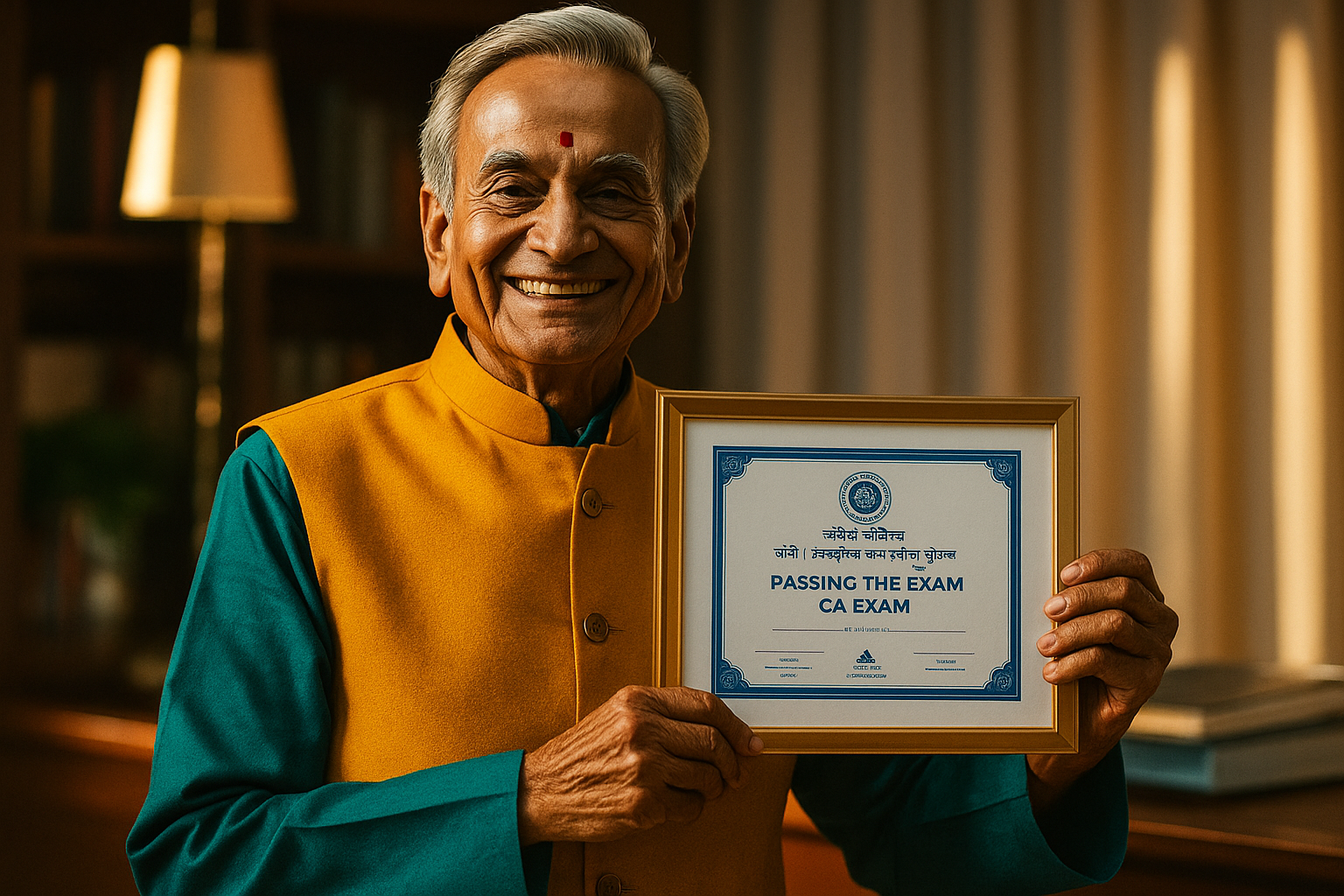
Jaipur, July 12, 2025
“They say dreams have no age — and 71-year-old Tarachand Agarwal has just proved it.” By clearing one of the most prestigious and challenging exams in India — the Chartered Accountancy (CA) exam — he has broken not just age barriers but also inspired a whole generation of youth and senior citizens alike.
Hailing from Rajasthan’s Sikar district, Tarachand Agarwal had retired as a manager from the State Bank of India. But retirement for him wasn’t about slowing down — it was about rediscovering an old dream. Instead of settling into a life of rest, he decided to pursue what he had left behind: becoming a CA. And with the same discipline and dedication as any young aspirant, he started studying again.
Family Became His Strength
His journey was far from lonely. His entire family stood behind him like a rock. His son arranged online study material, his daughter-in-law ensured he ate on time, and his granddaughters made motivational charts to keep his spirits high. The household transformed — it felt just like a student’s home before exams.
Even ICAI Congratulated Him
The Institute of Chartered Accountants of India (ICAI) also acknowledged his incredible achievement with a congratulatory tweet, stating, “Mr. Tarachand Agarwal has shown the nation that learning has no age limit. He is a true inspiration to us all.”
What’s Next for CA Tarachand?
Speaking about his future plans, Tarachand said:
“I want to mentor rural youth who drop out of studies due to financial constraints or lack of self-belief. I want them to know — if I can become a CA at the age of 71, they can achieve anything too.”
Art
Orange Day Adds a Splash of Joy at DAV Centenary Public School, Jaipur

Jaipur, July 10, 2025
The tiny tots of DAV Centenary Public School, Jaipur lit up the campus as they came dressed in cheerful shades of orange to celebrate Orange Day with great excitement and enthusiasm.
The pre-primary wing turned into a lively sea of orange—from clothes and accessories to creative decorations—all reflecting the spirit of joy, creativity, and energy that the colour symbolizes. Teachers thoughtfully planned the day to help children not just enjoy, but also learn the meaning behind the colour orange—a symbol of hope, enthusiasm, and prosperity.
The classrooms were buzzing with laughter and activity as the little learners took part in various fun-filled games, storytelling, drawing, and creative expression sessions. To boost their communication skills, each child was encouraged to bring an orange-coloured object from home and speak a few lines about it in front of their classmates. For many, it was their first public speaking moment, and they did it with adorable confidence.
Principal Mr. A.K. Sharma visited the classrooms to cheer on the children. He appreciated the thoughtful planning of the teachers and said, “Activities like these help children build confidence, express themselves freely, and connect learning with real-life experiences.”
It was a delightful sight to watch the little ones bursting with curiosity, dressed in glowing orange, exploring and expressing themselves. The day left behind not just smiles and laughter, but also a colourful memory in the hearts of the young students.
Education
Guru Purnima Celebration at DAV CPS, Jaipur – A Heartfelt Tribute to Guiding Lights
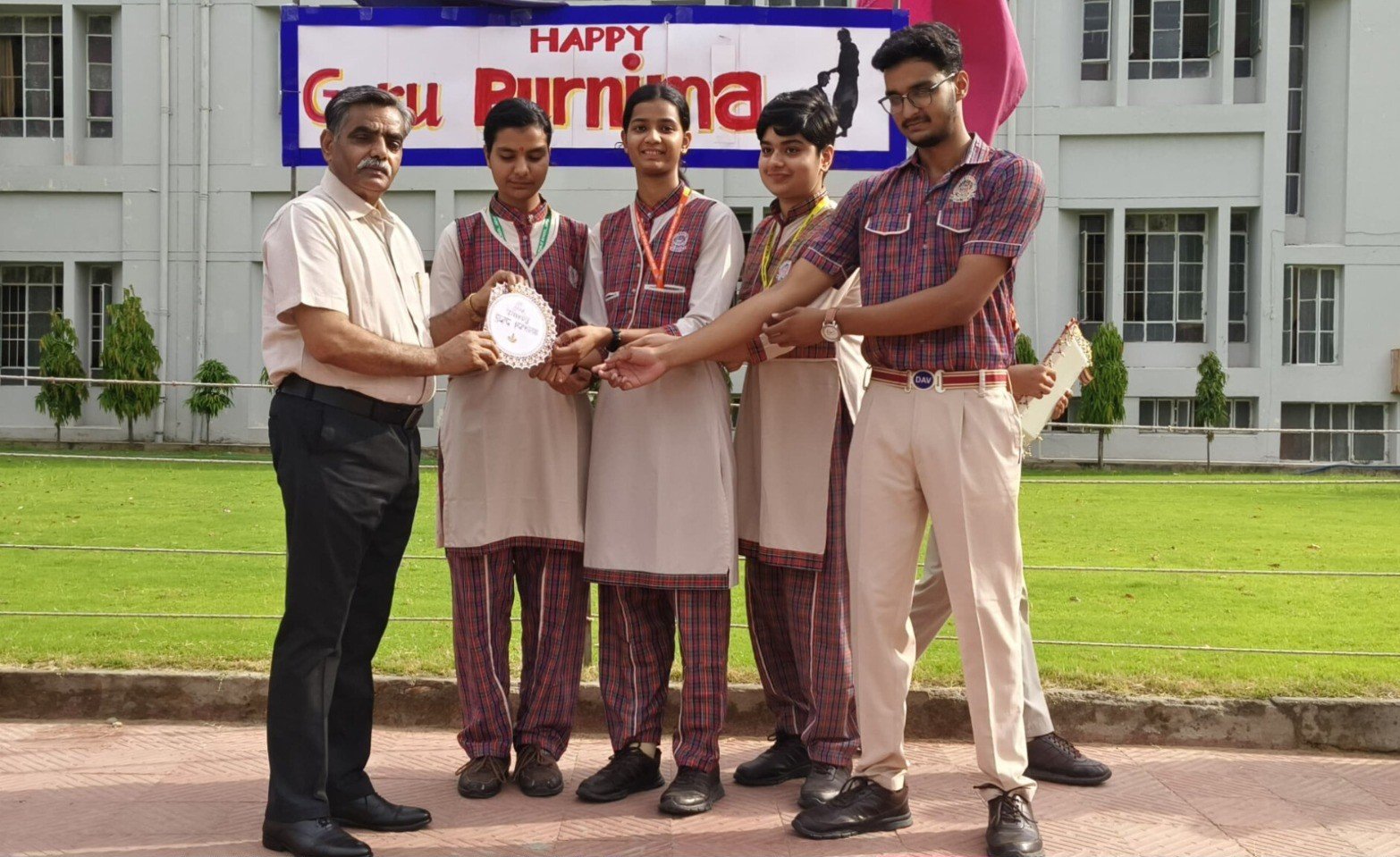
Jaipur | July 10, 2025
In an atmosphere filled with devotion, gratitude, and inspiration, DAV Centenary Public School, Vaishali Nagar, Jaipur celebrated Guru Purnima with heartfelt enthusiasm on Thursday, July 10. The event turned out to be more than just a celebration—it was a beautiful expression of love and respect for the teachers who illuminate the path of learning for their students.
The morning assembly set the tone for the day with the soothing sounds of shlokas dedicated to gurus, creating a spiritually charged environment across the campus. The essence of the celebration was beautifully captured in a speech that explained the cultural and historical roots of Guru Purnima, reminding everyone of the powerful legacy of the guru-shishya tradition.
Students poured their hearts out through soulful poems, melodious songs, and inspiring speeches, each echoing a shared sentiment—deep respect for their mentors. A mesmerizing classical dance performance, portraying devotion and reverence towards gurus, stole the spotlight and left the audience spellbound.
One of the most touching moments of the day was when the students presented a handmade gratitude card to Principal Mr. A.K. Sharma, who has been a constant source of wisdom and encouragement. In his address, Mr. Sharma reflected on the irreplaceable role of teachers in shaping young minds and urged students to stay rooted in values, discipline, and lifelong learning.
“The presence of a guru in one’s life is a blessing,” he said. “True success comes not just from knowledge, but from the humility to keep learning.”
The event concluded on a thoughtful note, leaving everyone—teachers, students, and staff—feeling more connected, more thankful, and more inspired. Guru Purnima at DAV CPS was not just an event, but an experience that reminded all of the timeless role of a teacher—not just in the classroom, but in life.
Education
Strong Start to Senior Secondary: Vardhman Srikalyan International School Holds Class 11 Orientation & PTM
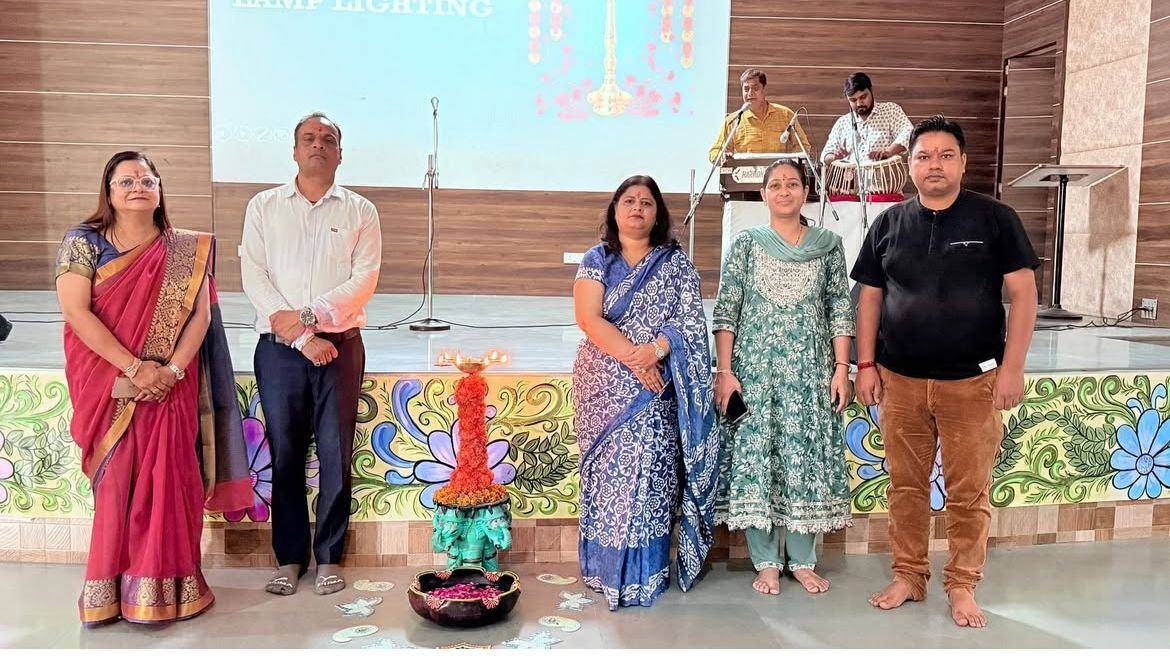
Jaipur | July 2025
Vardhman Srikalyan International School recently welcomed the parents of Class 11 students for an inspiring and well-structured Orientation Programme and Parent-Teacher Meeting, aimed at laying a strong foundation for the new academic session 2025–26.
Held under the meaningful theme “Building Bridges for a Brighter Future,” the session focused on strengthening the crucial link between school and home during this significant transition to senior secondary education.
The programme opened with a warm and motivational address by Principal Ms. Renuka Joshi, who underlined the value of shared responsibility and consistent communication between educators and parents. “When schools and parents work as one team, the student always wins,” she remarked, setting a thoughtful tone for the day.
Parents were then taken through a comprehensive presentation outlining the curriculum structure, subject choices, assessment patterns, and key expectations for the upcoming academic year. The aim was not just to inform but to empower parents with clarity and confidence as their children step into a more focused and formative stage of education.
The orientation also provided a platform for interactive discussions, allowing parents to voice queries and connect directly with the faculty members.
Overall, the event served as a powerful reminder that education is most effective when it is a collective journey, and Vardhman Srikalyan International School continues to lead that path with vision, dedication, and a heartful approach to learning.
Election
DAV Centenary Public School, Vaishali Nagar, Jaipur Event Report: Talent Hunt Show
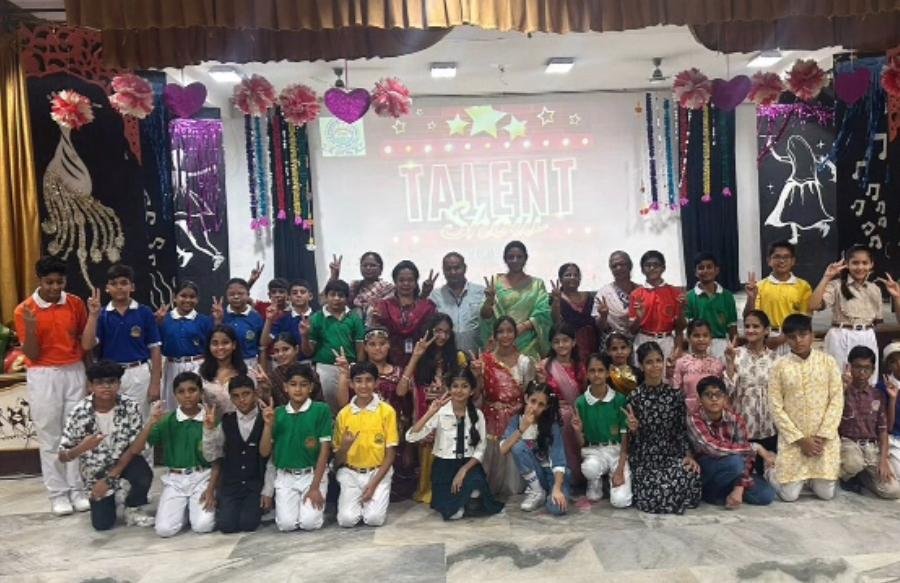
Date: 5th July 2025
Venue: School Auditorium
The School Auditorium was abuzz with excitement on 5th July 2025 as DAV Centenary Public School, Vaishali Nagar, hosted a vibrant Talent Hunt Show for the new students of Grades 6 to 8. Organized under the dynamic leadership of the School Principal, Mr. A. K. Sharma, the event served as a wonderful platform for budding artists to express themselves and build self-confidence.
A total of 35 enthusiastic students participated, showcasing a rich array of talents. Performances included classical, semi-classical, folk, and Bollywood dances; instrumental music featuring the tabla, casio, and kongo; as well as vocal renditions in Hindi, English, and even Spanish. The audience was thoroughly enthralled by the sheer diversity and creativity on display.
The event was efficiently coordinated by the class teachers of Grades 6, 7, and 8, ensuring a seamless flow of performances. The program concluded with an inspiring message encouraging students to continue nurturing their talents, followed by a warm vote of thanks from the coordinators.
The Talent Hunt Show ended on a high note, leaving the audience cheerful, inspired, and proud to be part of the DAV family.
Election
Uttar Pradesh High Court Gives Green Signal to Merger of 5,000 Schools, Dismisses Petition Filed by 51 Students

Contents
Lucknow | July 8, 2025
In a major relief to the Yogi Adityanath-led government, the Allahabad High Court’s Lucknow bench has upheld the state’s decision to merge nearly 5,000 government schools with low student enrollment. The court dismissed a petition filed by 51 students from Sitapur district who had challenged the move, calling it a violation of their Right to Education.
The High Court clarified that this is not a case of school closures, but of “pairing” — where smaller schools with fewer than 50 students are being linked to nearby better-equipped institutions to improve quality and access to education.
What the Court Said
- Not mandatory to have a school within 1 km: The bench, headed by Chief Justice Pankaj Bhatia, stated that the Constitution guarantees education under Article 21A but does not specifically mandate that a school must be located within 1 kilometer of every child’s home.
- “Pairing, not shutting down”: The court accepted the government’s argument that the policy is not about closing schools, but about optimizing resources and ensuring that students get access to better infrastructure, teaching, sports, and digital learning tools.
- Wastage of resources: The state also argued that several schools were running with extremely low enrollments and misutilization of resources — including teachers and funds.
Concerns Raised by Petitioners
- Distance and safety: Parents argued that merging schools would force young children to travel longer distances, which could increase dropout rates and pose safety risks.
- No survey or consultation: The petition also questioned why the government proceeded with such a massive change without publishing any survey, public report, or seeking inputs from stakeholders.
What Happens Now
- The High Court has cleared the way for the state to proceed with the pairing process.
- However, the door remains open for further legal action, as some education unions and political groups are reportedly considering taking the matter to the Supreme Court.
Education
Empowering Educators: A Three-Day Learning Journey at DAV Centenary Public School, Jaipur
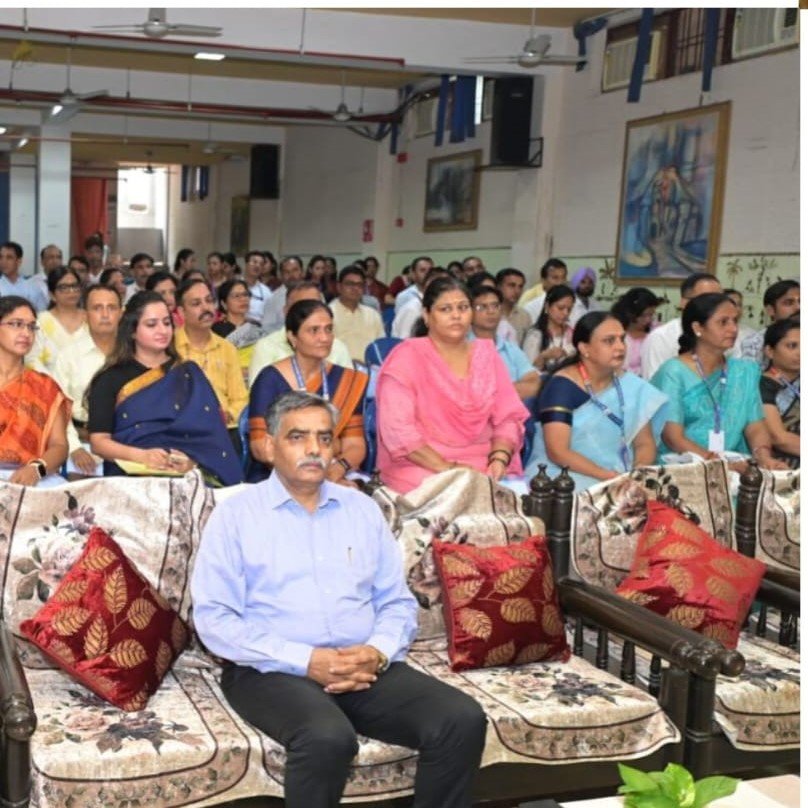
Contents
Jaipur, June 28, 2025 – Classrooms may have been quiet, but learning was louder than ever at DAV Centenary Public School, Jaipur, where teachers became students once again.
From June 26 to 28, 2025, the school hosted a powerful Offline Three-Day Capacity Building Programme (CBP) Cycle-I under the aegis of DAV Centre for Academic Excellence (DAVCAE), New Delhi. Organized jointly by Rajasthan Zone-A and Zone-C, the programme brought together 122 passionate educators from 12 DAV schools, determined to grow, connect, and reimagine their classrooms.
Training with a Purpose, Teaching with a Heart
Set across 11 different venues, the CBP wasn’t just a workshop—it was a movement. From Primary to Senior Secondary, from English to Science, and even Sanskrit to EEDP, each subject found its voice through hands-on sessions, thoughtful discussions, and expert insights shared by 31 DAVCAE-trained Master Trainers.
What made this training unique was its soul. It wasn’t about adding more chalk to the board; it was about lighting a new spark in each teacher. Topics like experiential learning, inclusive education, ICT integration, and pedagogical innovation became more than concepts—they became goals.
A Celebration of Wisdom, Music, and Togetherness
The programme began on a graceful note with the lighting of the ceremonial lamp, followed by a heartfelt welcome by Mr. A.K. Sharma, Principal of the host school and ARO of RTC Jaipur Cluster.
But this wasn’t just about academic rigor. Each evening bloomed into a musical celebration, where teachers, educationists, and even alumni came together—not just to perform, but to connect, express, and celebrate their shared purpose. These cultural evenings reminded everyone that behind every textbook is a human story.
Voices that Inspired: Messages from Leaders
Words of encouragement from Mr. Navneet Thakur (Cluster Head, RTC Rajasthan Zone-A) and Mr. Harbans Thakur (Principal, DAV HZL Sr. Sec. School, Zawar Mines) echoed throughout the event. Both leaders urged teachers to walk into classrooms not just with lesson plans, but with empathy, innovation, and collaboration.
Participants didn’t just attend—they engaged. They shared experiences, exchanged ideas, and walked away with new strategies, deeper clarity, and a renewed passion for teaching.

Gratitude, Certificates, and a Peaceful Goodbye
The programme concluded with a sincere vote of thanks by Mr. A.K. Sharma, who acknowledged every principal, teacher, and coordinator who made this event a success. Certificates of participation were awarded, not just as tokens but as symbols of commitment and growth.
As the event ended with the soulful chanting of the Shanti Mantra, there was a shared understanding: when teachers learn together, students shine brighter.

 Education1 month ago
Education1 month agoKota ICICI Bank Staffer Swindles ₹4.5 Crore, Gambles It All on Stock Market

 Bollywood1 month ago
Bollywood1 month agoHousefull 5 Movie Review: Akshay Kumar, Riteish Deshmukh Bring Laughter and Twists in Bollywood’s Biggest Comedy Franchise

 Education3 weeks ago
Education3 weeks ago11 Powerful Reasons Why DAV International Yoga Day Jaipur Uplifted Spirits!

 Cricket1 month ago
Cricket1 month agoBengaluru Chinnaswamy Stadium Stampede: 11 Dead, 33 Injured in RCB Victory Parade Chaos

 Education3 weeks ago
Education3 weeks ago7 Inspiring Highlights of DAV Foundation Day Jaipur Celebration – Amazing Vedic Legacy Revealed!

 Education2 weeks ago
Education2 weeks agoEmpowering Educators: A Three-Day Learning Journey at DAV Centenary Public School, Jaipur

 Credent TV3 weeks ago
Credent TV3 weeks agoVIBGYOR Summer Camp Ends on a High at DAV Centenary Public School, Jaipur

 Election1 week ago
Election1 week agoDAV Centenary Public School, Vaishali Nagar, Jaipur Event Report: Talent Hunt Show
































